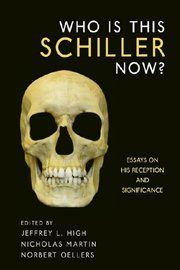Book contents
- Frontmatter
- Contents
- Foreword
- Acknowledgments
- List of Abbreviations
- Introduction: Why Is This Schiller [Still] in the United States?
- Part I Schiller, Drama, and Poetry
- 1 Lenz und Schiller. Die erlebnissymptomatische Dramensprache
- 2 Melancholy in Schiller's Dramas
- 3 Schillers Ästhetik der Trauer. Der Dichter als “elegischer” Lyriker und Dramatiker
- 4 Glühendes Wort zum Ideal über der versagenden Realität — zu Schillers Balladen
- 5 Zwischen Max Piccolomini und Buttler. Wallensteins Orts- und Zeitverluste
- Part II Schiller, Aesthetics, and Philosophy
- Part III Schiller, History, and Politics
- Part IV Schiller Reception — Reception and Schiller
- Part V Schiller Now
- Notes on the Contributors
- Index
3 - Schillers Ästhetik der Trauer. Der Dichter als “elegischer” Lyriker und Dramatiker
from Part I - Schiller, Drama, and Poetry
Published online by Cambridge University Press: 05 February 2013
- Frontmatter
- Contents
- Foreword
- Acknowledgments
- List of Abbreviations
- Introduction: Why Is This Schiller [Still] in the United States?
- Part I Schiller, Drama, and Poetry
- 1 Lenz und Schiller. Die erlebnissymptomatische Dramensprache
- 2 Melancholy in Schiller's Dramas
- 3 Schillers Ästhetik der Trauer. Der Dichter als “elegischer” Lyriker und Dramatiker
- 4 Glühendes Wort zum Ideal über der versagenden Realität — zu Schillers Balladen
- 5 Zwischen Max Piccolomini und Buttler. Wallensteins Orts- und Zeitverluste
- Part II Schiller, Aesthetics, and Philosophy
- Part III Schiller, History, and Politics
- Part IV Schiller Reception — Reception and Schiller
- Part V Schiller Now
- Notes on the Contributors
- Index
Summary
As a poet of mourning Schiller has been neglected during the last 200 years. The reason for this neglect is that Schiller articulated his theory of mourning relatively late in his essay On Naïve and Reflective Poetry (1795/96; 1800) and that he left it as a fragment. He was so preoccupied by his definition of the idyllic that he neglected to develop his theory of mourning. This article is to be understood as complementary to the research on Schiller's concept of the idyllic and deals with his concept of mourning in his poetry as of 1782 and his dramas from Don Karlos to Demetrius.
WER IST DIESER SCHILLER HEUTE? Konfrontiert mit der Coleridge-Frage dieser Konferenz, überprüft man als Beiträger die Titel, die man ihm zugedacht hat: Schiller als Dichter des Idealismus, als Vertreter der Weimarer Klassiker, als wichtigster deutscher Nationaldramatiker neben Brecht, als Vermittler zwischen Kant und Hegel auf dem Gebiet der Ästhetik, als Theoretiker der modernen Literatur. Meine Antwort lautet: Schiller als Dichter der Trauer — nicht ausschließlich, denn man wird der Utopie einen Raum in seinem Denken und Dichten einräumen müssen —, aber doch der Dichter des Elegischen, wie er es in seinem Aufsatz Ueber naive und sentimentalische Dichtung definierte. Wer sich darum bemüht, mehr über Schiller als Lyriker und Dramatiker zu erfahren, wird sich mit seiner Ästhetik der Trauer auseinandersetzen müssen.
- Type
- Chapter
- Information
- Who Is This Schiller Now?Essays on his Reception and Significance, pp. 55 - 68Publisher: Boydell & BrewerPrint publication year: 2011



